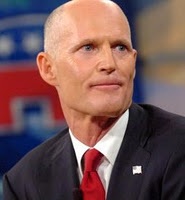
If there was any question, Gov. Rick Scott is in re-election campaign mode.
Scott released his first campaign ad this week, though he put it up only on YouTube, and on Tuesday while talking with reporters laid out what is expected to be the main mantra of his campaign – that he has been at the helm as the economy has come back.
“We’re going to show that there’s a stunning contrast (between) the economy I inherited and the economy today,” Scott said after landing at the airport in Tallahassee after a morning event.
It is no coincidence that he would tie the economy he inherited to the term of former Gov. Charlie Crist, who is now considering running to unseat Scott. The governor has for weeks been talking about the current economy mostly as it relates to the economy during the Crist administration and did so again on Tuesday.
“In the four years before I became governor, the state had lost 832,000 jobs, unemployment tripled from 3.5 to 11.1 percent, state debt had increased by over $5 billion, and, you know the housing market collapsed,” Scott told reporters.
Scott has also taken on a number of popular causes, from an across-the-board teacher raise, to opposition to college tuition increases to firm opposition to tax increases, or anything that looks like one.
The new ad focuses on the economic comeback in Florida, showing video of Scott visiting companies that have been hiring. It has a number of workers and company officials touting Florida’s improving business climate.
Watch Gov. Rick Scott’s New YouTube Campaign Ad Here.
Scott has benefitted from a dwindling unemployment rate – which is now below the national rate for the first time since before he took office.
Still, Scott appears to have a job to do. Two recent polls have shown Crist ahead of Scott in a hypothetical governor’s race, and while some polls have shown improvement for the governor, he is still hampered by low approval ratings.
The governor’s campaign fundraising arm has also swung into full gear, evidently, with a big uptick in fundraising in the first two weeks of March. The committee, “Let’s Get to Work,” brought in more than $800,000 during that period.
by David Royse


